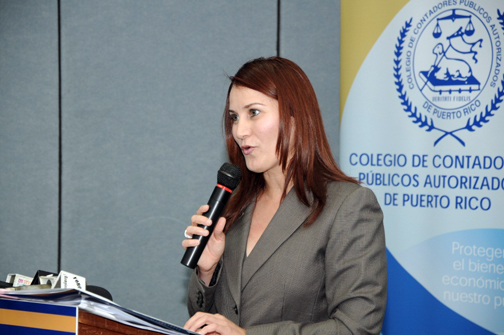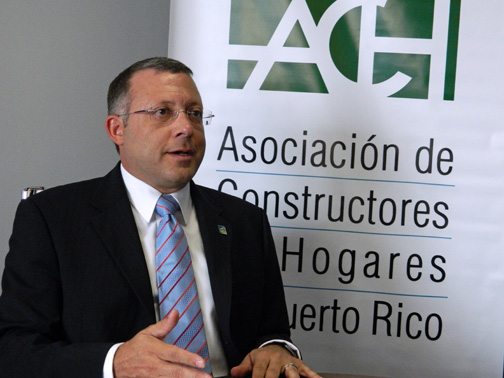CPAs present proposals to gubernatorial candidates

The Puerto Rico Society of Certified Public Accountants presented Thursday a sweeping list of recommendations for the candidates running for governor in November, to address problems in five specific areas: electricity costs; the ailing retirement system; the municipal tax system; economic development; and the health system.
The suggestions, contained in a document the trade group produces every four years, present the current scenario in each area, followed by their take on how to tackle them.
“These recommendations are intended to solve some of the problems facing our island in five specific areas with emphasis on economic and administrative aspects,” said CPA Society President Denisse Flores, during a news conference at the organization’s Hato Rey headquarters.
“We do not claim to cover all areas of public administration, but rather propose measures that are feasible locally and can certainly be included in political party platforms,” she said.
Less oil, more renewable energy
In the area of energy costs, the group proposed reaching a short-term consensus to speed up conversion to natural gas and reduce the dependence on oil. Furthermore, the CPAs suggested evaluating alternatives to protect consumers from increased oil cost and look into other areas to cut costs at the Puerto Rico Electric Power Authority.
The CPAs also proposed “supporting and encouraging” the development of generation capacity with sustainable energy sources, continue efforts to reduce electricity theft and losses on accounts receivable, and shrink losses in power transmission and distribution systems.
Mid-range, the CPAs suggested strategically analyzing Prepa’s structure and its role, as it loses its monopoly status on energy production.
Fixing the retirement system
Regarding the island’s troubled retirement system, the CPAs suggested: an across-the-board integration of the administrative structures of all of the public sector’s retirement offices; requiring agencies, municipalities and other government offices that any approved retirement window include the prepayment of the actuarial cost; and deducting municipal debt with the government retirement systems from their share of the sales and use tax collections.
The trade group also proposed: increasing employer and employee contributions until reaching the actuarial base; reducing benefits to retirees, such as the Summer and Christmas bonus and health plan coverage; increasing the eligibility age and establishing a retirement benefit cap on employees who began contributing to the system before 1989; evaluating the transfer of the central government’s Retirement System bonds; and reviewing the formula to calculate benefits to increase from three to 10 years the period of time used in determining the pension.
Streamlining municipal duties
The CPAs also addressed the way municipalities are currently structured, suggesting that rather than acting independently, towns should consider consolidating or regionalizing common areas such as accounting, disbursements, external audits, maintenance of public facilities and solid waste collection.
The professional organization also proposed reformulating the obligations of the Office of the Commissioner of Municipal Affairs to serve as a center to resolve controversies and the go-to place to for matters of municipal licenses and construction taxes.
Also on the extensive list of suggestions was evaluating the performance of the Municipal Revenue Collections Center to streamline processes.
Long-term economic development strategies
During its presentation, the CPAs also proposed restructuring the Puerto Rico Industrial Development Co. so that it can actively attract modern industries to the island and the expansion of existing ones.
The group also mentioned moving forward with lobbying efforts in Congress to promote a tax incentive that attracts foreign investment, while supporting the establishment of local industries.
In the area of tourism, the group lobbied for the establishment of a Destination Management Organization, something that the current administration has supported.
The group also got behind the elimination of cabotage laws, which the General Accountability Office is presently analyzing.
Integrating health system
Gubernatorial candidates should also consider integrating into the planning, development and evaluation of the Puerto Rico health system environmental factors and conditions, lifestyles and living conditions, education and other elements related to human behavior. The CPAs also recommended updating the methodology used in collecting data related to the health of the island’s population.
The government should assume the role of facilitator, promoting and encouraging preventive medicine programs across all system components, while integrating the private sector when drafting public policy.
The CPAs also proposed adopting the concept of “healthy communities,” which stipulates the development of programs and activities to promote good physical and mental health. Furthermore, the group also suggested encouraging education of health professionals to ensure the stay on the island, as well as providing incentives to retain surgeons.











